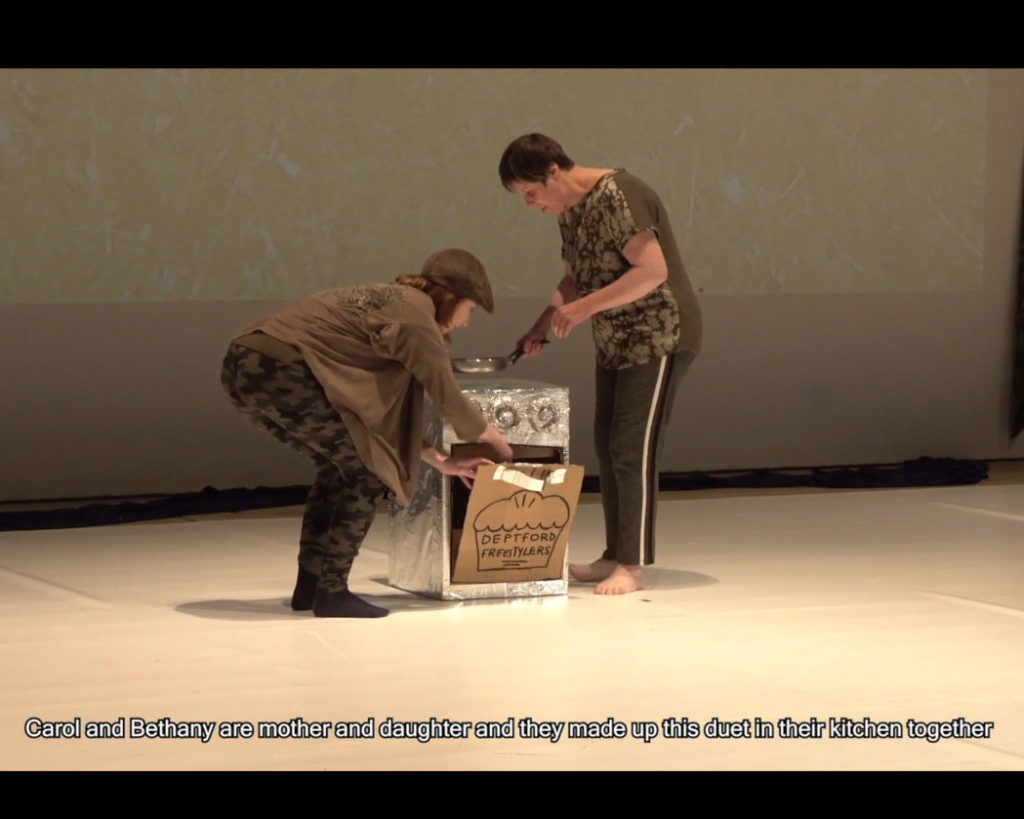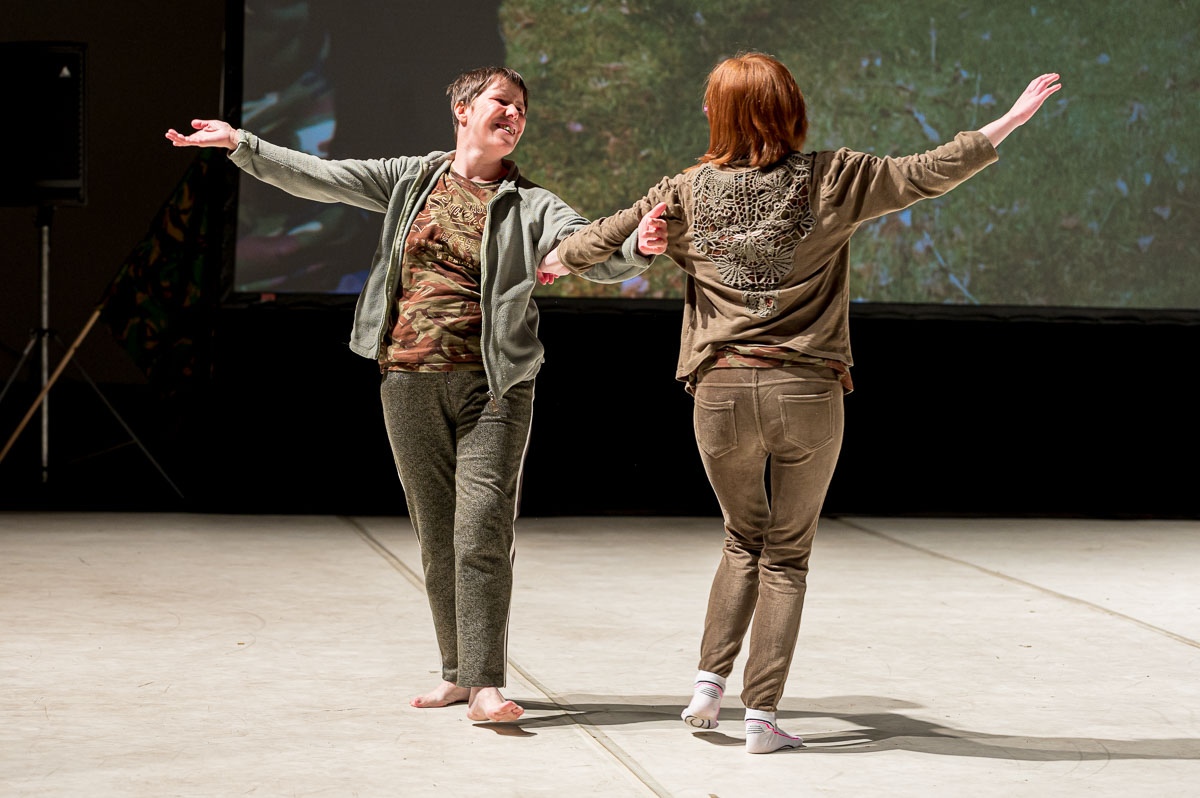Reflection – Waiting, Relating, Coordinating: Kavina Pound
Self-proclaimed activist and dance artist, Kavina Pound concluded the launch of her Live Archive: Waiting, Relating and Coordinating at Siobhan Davies Studios proclaiming: ‘I use the term this ability not dis-ability’. In reworking the language of disability, Pound echoes the clarion call of the 20th century disability justice movement: ‘nothing about us without us’. Both are a provocation for “inclusivity” as a verb; an on-going, embodied activity and principle that stems from the knowledge, agency and existence of dis-abled people.
Hosted at Siobhan Davies Studios this February, Pound’s Archive combines a live spoken monograph, solo performance, food, music and discussion to locate dance within the on-going project of inclusivity. Through this visceral choreography, Pound reimagines dance as an embodied ethic that is continually shaped by and shapes her lived experience of dyspraxia and arthritis, duties as a parent and love of creativity.
Chapter 1 – Waiting
Duh duh-duh duh duh duh duarrr, duh duh-duh duh duarrrr
With the glitzy fan-fare of the Strictly Come Dancing theme, the Roof Studio becomes a homely living room on a Saturday night. Storybook in hand – ‘Surprise! It’s the Strictly Come Dancing Annual’- Pound begins the narration of a fairytale. Her fairytale. Beginning with a young girl who danced in her kitchen, dreaming of the stage, but was held back through a lack of inclusive dance in Shropshire.
Standing alone in centre of the studio, Pound patiently holds the audience in her gaze. A deep, reverberating sound of humming and her upper body begins to hunch over. Gently, she folds her arms, head and chest inwards, then out again, her gaze returning to the audience. She inhales. She waits. She exhales. She waits.
Defying negative disability narratives, Pound’s autobiographical fairytale is a nuanced choreography that rewrites the ups, downs, starts, stops, turns and rolls of being a disabled dancer, mother and advocate. Living with what she calls ‘an invisible disability’, there were and continue to be many instances where ‘nobody would see or hear me’. From childhood experiences of social exclusion to teachers stigmatising her ‘lack’ of coordination and colleagues today continuing to doubt her intellect, Pound nevertheless emphasises the strength, hope and possibility that lies in disability.
One step forward
Two steps back
One step forward
Two steps back
Chapter 2 – Coordinating
Facing redundancy from her full-time job during the pandemic, Pound explains how she found herself with a terrifying but exciting window of opportunity. With her two children building independence as adults, Pound took a leap of faith and threw herself into dance. Embarking on the Biodanza Personal Development Course, Pound witnessed the physical and pedagogical possibilities prompted by her presence in dance spaces. It was only when teachers began to recognise her potential and adapt their classes to her needs – such as using a slower-pace and breaking down exercises – that Pound saw an improvement in her physical coordination, movement memory and balance.
‘Never’, she affirms, ‘be afraid to have someone different in your class’.
Folding her upper body inwards again, Pound uses the momentum of the motion to propel her into a spin before launching into a leap sideways across the room, legs shooting in opposite directions. Taking impetus from her arms which windmill up and over her head, Pound rolls down to and across the floor in an expansive, smooth sweep.

Chapter 3 – Relatedness
As a uniquely live and embodied medium, Pound’s archive emphasises the distinct role dance played in strengthening both her sense of self and relations with others. Informed by her degree in Social Policy and previous work supporting disabled young people, Pound began teaching for organisations like SLIDE as well as advocating for social proscribing and arts for health. Dance companies Deptford Freestylers, Candoco and Stopgap took Pound to stages across the country, before she set up her own inclusive dance network ‘Danzability’, with her daughter.
‘This is what Biodanza does’, Pound narrates, ‘it changes people, subtly over time.’
What change could be so profound as Pound’s decision to switch her name from Carole to Kavina meaning: The Playful Poetess. Whilst this was an attempt to create a more show-biz stage name, Pound’s toying with naming is a reminder that, contrary to rigid categories and labels such as ‘disability’, live existence is not static or pre-determined. Pound’s playful poetry permeated the Roof Studio, as the equitable sharing of food, performance, music and discussion enabled a dance across the boundaries of audience/performer, family/colleague, home/stage. Surrounded by close family and friends, including her son Garry and daughter Beth, who have embarked on their own careers within dance and performance, Pound’s Live Archive is an embodied and material testament to the people she continues to inspire, teach and support.
This Live Archive is dance derived not from specialised techniques or institutions, but the home as a political sphere. Through disrupting the regulatory boundaries constraining “proper” dance – honouring bedroom boogies and childhood dreams – Pound lives to the principle that every-body can dance.
Kavina Pound’s Live Archive: Waiting, Relating and Coordinating took place on 24 February 2024. It was commissioned and hosted by Siobhan Davies Studios as part of Artist Archive, a programme that questions what an archive can be and who gets to have one.
This text was commissioned by Siobhan Davies Studios.
